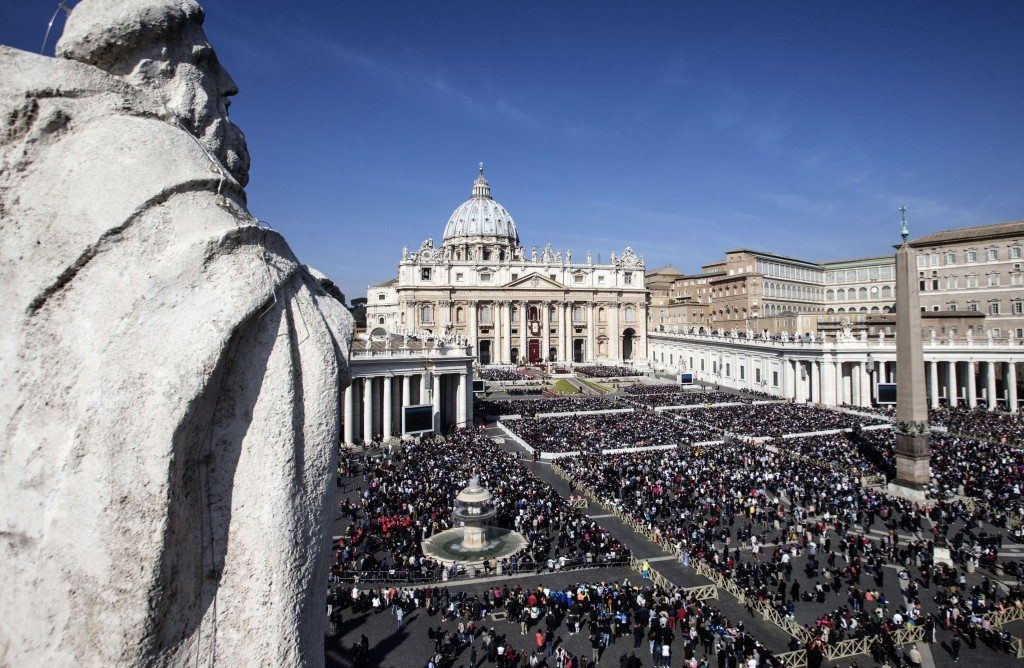Historically, the Lateran Treaty in 1929, which settled the “Roman question” by paying the Vatican for the loss of the Papal States to the newly unified Italian state, was a mixed bag. On its 90th anniversary relations between the two states may be publicly focused on immigration, but temporal power remains very much part of the subtext.
“It went very well,” said Italian Cardinal Pietro Parolin, the Vatican’s Secretary of State, while exiting a Feb. 14 event at the Italian embassy to the Holy See commemorating the anniversary.
“There was a climate of great listening,” he said.
The event saw the participation of the top diplomats on both sides. The Italian President Sergio Mattarella came, accompanied by the leaders of the Senate and Parliament as well as Prime Minister Giuseppe Conte and his deputy Luigi di Maio, representing the populist left.
Beyond Parolin, the Vatican deployed Venezuelan Archbishop Edgar Peña Parra, the pope’s “substitute,” or chief of staff; the minister for relations with states, British Archbishop Paul Gallagher; and the head of the Italian bishops’ conference (CEI), Cardinal Gualtiero Bassetti of Perugia.
A notable absence was Matteo Salvini, Italy’s Minister for the Interior and head of the right-wing populist movement Northern League. His absence led to speculation that the politician’s anti-immigration policies and rhetoric might make him persona non grata at the Vatican.
“It’s a cold moment” in the relations between Italy and the Holy See, said Andrea Riccardi, founder of the Community of St. Egidio and Christian scholar, a few days before the event. “On the great theme of migrants, Pope Francis’s church has a very different position from the Italian government.”
Immigration is not the only hot-topic fueling animosity between the two states. Requests by the United Nations and several politicians that the Vatican pay taxes to the Italian state have vexed the already strained relations.
These factors contributed to making the commemoration of the Lateran treaty the first encounter between Holy See officials and representatives from the left and right-wing populist coalition ruling Italy since March 2018.
“We are Catholics,” Conte is said to have told prelates at the event in an effort to break the ice. The Italian prime minister has a Catholic upbringing, having frequented Villa Narzareth - known as the “Temple of Catholic Democracy” and once headed by none other than Parolin.
But the new antiestablishment coalition in Italy has few to no ties to the Vatican circles made relevant by the hiccuping dialogue that currently exists between the two states especially when compared to the revolving doors of the Holy See when it came to the last governing parties.
“Inclusion,” Parolin told journalists, was at the starting part of the conversation especially concerning the poor and marginalized parts of society.
“On this theme we worked a lot, but then there naturally are instruments that allow this inclusion and there we see small nuances,” he added. “We shared this typical commitment of the Church that must belong to every authority at the service of the common good.”
From there, the Vatican’s Secretary of State said, the conversation moved from immigration policies, to the Middle East and even Venezuela, which has witnessed the political engagement of both Italy and the Holy See.
Parolin called it “a tracking shot on all the points of crisis in the world, which are many,” and confirmed the “Church’s commitment for the development of countries from which migrants originate.”
“We insisted a lot that there be integration policies,” he continued, “aware of the many other problems that exist and also recognizing that the problem must be addressed by all, not only by one country.”
Salvini along with Pope Francis were not present at the event leading some Vatican observers to believe that the relationship between the Holy See and Italy will rest in the hands of Parolin and Conte.
In the background and before the event, Salvini emphasized that he will not budge on the question of immigration. During a television appearance, the politician even took out a rosary gifted to him by an elderly fan and kissed it, a trope that he has used frequently to display his faith despite Vatican opposition.
On Feb. 15, Francis could be seen smiling and taking a selfie with priests while holding a pin reading “keep ports open,” in clear opposition to Salvini’s policy of closing Italian naval ports to migrant vessels.
“Fear is the origin of every slavery and every dictatorship,” Francis said at the meeting with Italian clergy, “We renounce the encounter with the other to build barriers: this is not human. Those who have the strength to win over fear are invited today to go on top of roofs and invite others to do the same.”

